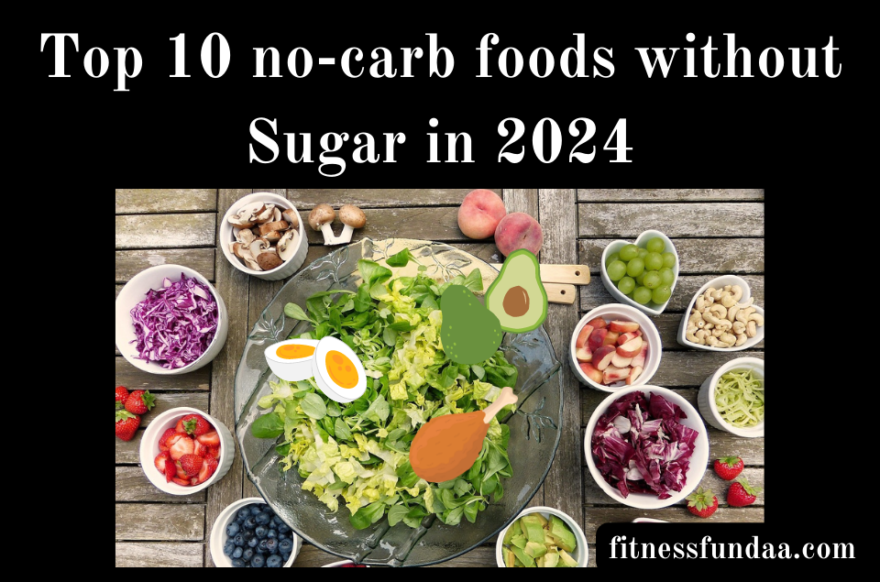Introduction:-
The main principle of low carb is to limit carbohydrate intake and that will directly lead your body to a process called ketosis. Ketosis helps in fat loss, In a low-carb diet, you should limit carbohydrates but ensure that you are taking other essential nutrients and amino acids. Top 10 no-carb foods without Sugar in 2024. no-carb foods without Sugar. no-carb foods.
Otherwise, you will get deficiencies in certain nutrients and make your condition even worse. Low-carb diets are becoming very common nowadays as people start to take a good look at better health and understand what kind of foods to eat. Low-carb diet mainly consists of fats and proteins and a low amount of carbs.
When you first start a low-carb diet you should not suddenly drop carbs, gradually start eating with one high-fat and protein meal then start losing more carbohydrates gradually. If you suddenly drop carbs then you will feel the following symptoms:
- Constipation
- Headaches
- Muscle cramps
- and Low energy
But these are only short-term once you get used to it these side effects will go away. In this article, we are talking about the top 10 low-carb food items that taste amazing:
Top 10 no-carb foods that taste delicious
Avocado:-
Avocados contain dietary fiber, potassium, high amounts of fats, and low amounts of carbohydrates.
If you look into listed carbs, most of the cabs present in avocado are fiber so it doesn’t contain any digestible net carbs.
Nutritional facts about avocados are:-
- 240 calories
- 13 grams of carbohydrate
- 3 grams of protein
- 10 grams of fibre
website: Wikipedia
Strawberries:-
Strawberries are a great source of antioxidants, vitamin C, and manganese, and also a good amount of folate and potassium.
Plant compounds are present in strawberries, They are beneficial for heart health and blood sugar levels. It is normally eaten raw because it has delicious flavors.
Nutritional facts about strawberries are:-
- Calories only 32 kcal
- 7.7 grams of carbohydrate
- 2 grams of fibre
- 0.3 grams of fat
website: Wikipedia
Mushroom:-
Mushrooms are super low in calories but contain plenty of nutrients. Due to the exposure to UV rays mushrooms are a natural non-animal source of vitamin D2 that’s capable of increasing blood levels effectively just like supplements.
They do provide a decent amount of protein compared to other vegetables which would be helpful if you are a vegetarian as they will help you to increase your protein intake.
Nutritional facts about mushrooms are:-
- Calories only 21 kcal
- 3 grams of carbohydrate
- 1 gram of fibre
- 3 grams of protein
- 33% of daily vitamin D
website: Wikipedia
Lettuce:-
Lettuce is filled with nutrients It aids in Vitamin C to support the immune system, it is high in antioxidants which helps keep your bones healthy.
It has Calcium which is beneficial for the maintenance of bones, muscle, and blood clotting. It also contains vitamin K which is necessary for blood clotting and prevents bone mineral loss.
Nutritional facts about lettuce are:-
- Only 8 calories
- 1.5 grams of carbohydrate
- 1 grams of fibre
- 0.6 grams of protein
- 0.1 gram of fat
website: Wikipedia
Broccoli:-
Broccoli is one of the most beneficial vegetables out there. It is packed with healthful nutrients. It contains little dietary fiber, which helps in gut health and aids in the reduction of chronic heart diseases. Broccoli contains high amounts of Vitamin C and K both are beneficial for the skin.
Nutritional facts about broccoli are:-
- Calories only 35 kcal
- 2.3 grams of protein
- 5.6 grams of carbohydrate
- 2.2 grams of fiber
- 0.3 grams of fat
website: Wikipedia
Eggs:-
Eggs are so healthy that is the reason why they are known as nature’s multivitamin. They contain unique antioxidants that many people are deficient in. Eggs are filled with different types of vitamins, minerals, and quality protein.
Eggs taste good as well as contain so many vitamins and minerals which will help in growth and help in the chemical functioning of your body.
Nutritional facts about eggs are:-
- Calories only 77 kcal
- Traces of carbohydrate
- 5 grams of fats
- 6 grams of protein
website: Wikipedia
Chicken:-
Chicken is super high in so many nutrients, low in calories, and a good source of protein. Chicken makes a wonderful substitute for red meat. It is low in carbs and high in protein content. Chicken is super rich in various beneficial nutrients like protein, niacin, selenium, and phosphorus.
Chicken contains lean protein and it is an amazing source of amino acids, which help in building muscles, something which is important for every individual.
Nutritional facts about chickens are:-
- Calories only 122 kcal
- 24 grams of protein
- 3 grams of fat
- 0 grams of carbohydrate
website: Wikipedia
Walnuts:-
Walnuts are a great source of protein high in calories and fats. You can simply add walnuts into your diet, sprinkle them over the top of your salads, and blend them with smoothies to get extra antioxidants.
Walnuts can help you improve blood pressure if you healthily eat walnuts. Even a little bit of difference in blood pressure is known as a big achievement because of the risk factor of heart disease.
Nutritional facts about walnuts are:-
- Calories 185 kcal
- 4% water
- 4.3 grams of protein
- Vitamin B6, Folate and thiamine
website: Wikipedia
Chia seeds:-
Chia seeds are an excellent source of antioxidants, Antioxidants don’t only prevent them from going rancid but they also help in neutralizing reactive molecules which are known as free radicals.
The fibre and protein present in chia seeds help in losing weight so it becomes a great option for fat loss. Research also shows that eating fiber can help you prevent obesity. Similarly, the protein present in chia seeds can help you eat less because protein reduces appetite.
Nutritional facts about chia seeds are:-
- 138 calories
- 4.7 grams of protein
- 8.7 grams of fat
- 11.9 grams of carbohydrate (Complex carb)
- Fiber 9.8 gram
- Calcium 14%c
- Iron 12%
website : Wikipedia
Peanut:-
Peanuts are packed with high-quality fats and protein. They are also high in calories but can be eaten mindfully for maximum benefits. Peanuts provide protein, vitamins, minerals, and other antioxidants.
They have other significant health benefits like it promote fullness and it will protect you against heart disease. They become a good source of protein but some people are allergic to protein.
Nutritional facts about peanuts are:-
- Calories 567 kcal
- 25.8 grams of protein
- 16.1 grams of carbohydrate
- 4.7 grams of sugar
- 49.2 grams of fat
website: Wikipedia
Conclusion:-
Low-carb diets play an essential role in human health because they will help you lose weight, help you cure chronic heart diseases, and also aid in digestion.
But at a time when carbs are present everywhere in every form, it becomes really difficult for us to stay on a low-carb diet. Nonetheless, start with limiting carbs first. Do not completely remove carbs from your diet. Start by gradually minimizing added sugars, and refined flour and maintain a consistent amount with vegetables and fruits.
Depending upon how severe you are following carb restriction, always eat healthily like eating a good amount of fats and proteins. This will prevent you from nutritional deficiencies.
If you limit carbs and start to eat very few calories then ketosis will occur but along with that nausea, cramps, decrease in muscle mass and many other things will occur along with ketosis because of nutritional deficiencies.
FAQs on low-carb diet
What will happen if you eat low-carb food?
Your body will start breaking down fats into ketones for energy.
What are the restrictions of a low-carb diet?
There is only a limit that you can’t eat foods that have carbohydrates in them for eg. Pasta, bread, beans and lentils, Sweets, and many other high-carb foods.
Why is everyone following low-carb diets?
Low-carb diets have several benefits which is why everyone follows a low-carb diet.
Can everyone follow a low-carb diet?
Yes, everyone can follow a low-carb diet despite their age.
Is low-carb food healthy?
Yes, low carbs are healthy and also good for heart health.
Do low-carb foods enhance digestion?
Yes, low-carb foods are easily digestible which leads to better digestion.
Is blood sugar level affected by a low-carb diet?
It depends from individual to individual for some it might increase their blood sugar level for some it doesn’t.
Do we need to limit carbs?
Carbohydrates increase insulin levels so we need to limit carbs for better health.
What should be the fat percentage in a low-carb diet?
70-80% of fat should be eaten in a low-carb diet.
Does low-carb help in reducing cholesterol levels?
Yes, low-carb diets aid in reducing blood cholesterol levels.
see also: Top 10 best vegetarian protein foods in 2024
Reference links:-
https://www.healthline.com/nutrition/healthy-low-carb-foods

